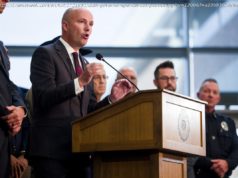The NRA isn’t solely to blame.
On Thursday a gunman entered the offices of a newspaper in Annapolis, Maryland, and opened fire, killing five people and injuring two. There have been more than 150 mass shootings in the U. S. this year, according to the Gun Violence Archive. Two Bloomberg columnists who write extensively about politics met online recently to consider the question, If most voters support stricter gun laws, then why can’t Congress pass any?
Francis Wilkinson: The easy answer is three letters: N, R and A. The harder question is why a lobby representing gun manufacturers is so influential. The usual reply is that the National Rifle Association is highly organized, and its members highly motivated, to exert maximum political pressure.
That’s true: fanatical, single-issue voters get results — especially when their opponents are invested across an array of issues. But there’s also a cultural/political angle. Gun owners are older, whiter and a shrinking part of the electorate. Once bipartisan, the NRA has become an integral component of the (older, whiter) GOP, advancing party goals — culture war attacks on „godless“ liberals, for example — that have ostensibly little to do with guns.
As gun politics have grown increasingly partisan, and „owning the libs“ has become an increasingly popular form of conservative catharsis, the NRA and GOP have become entwined. State Republicans pass reckless laws — guns in bars! — to make the libs mad and the NRA happy.
No more than a few dozen members of Congress genuinely believe there shouldn’t be universal background checks for gun purchases. But most Republicans come from Republican places. As long as the price of defying the NRA is higher than the price of going along, they’ll go along to get along.
Jonathan Bernstein: It’s all about the parties. In an era of strong party polarization in Congress, very few policy areas are likely to produce significant legislation unless there’s unified government for a party that makes action on that issue a priority.
So whatever overall public opinion says, almost all elected Republicans will oppose any new laws as long as the NRA is a Republican-aligned interest group. That means it’s very hard to pass any laws restricting guns with a Republican president or when Republicans have majorities in the House or Senate.
What about the Democrats? While they were always notionally in favor of what they call „common sense“ gun laws, Democrats blamed their historic loss in the 1994 midterms on the passage of the Brady Bill and a ban on semi-automatic rifles during the first two years of Bill Clinton’s presidency. Whether gun politics really was responsible isn’t important. What matters is how political actors interpret election results, and Democrats very much interpreted their 1994 loss — including the stunning defeat of then-Speaker Tom Foley — as a bright neon warning about guns.
That’s finally shifting, especially after the 2011 attack on former Rep. Gabrielle Giffords and the horrifying mass shooting at Sandy Hook Elementary School in Newtown, Conn., in 2012. But it is critical to understanding why guns simply weren’t on the agenda when Democrats had the votes to do something in 2009.
Frank: Since you live in Texas, Jon, and because guns are a highly regionalized issue, I’m interested in how you see gun politics developing by states. Blue states are regulating guns much more aggressively, while red states have been deregulating (although that seems to be slowing, in part because there is little left to deregulate).
Jon: Yes. One of the consequences of guns becoming integrated within partisan polarization is that Democratic states are passing restrictions, while Republican states are not. Since there will probably be more Democratic state governments after the elections this year, the newly elected Democrats are going to act.
The new generation doesn’t know Tom Foley from Tom Felton; I count only 14 House Democrats who served with Foley. So that lesson has worn off, which makes it easier for them to, for example, start reading and reacting to polling.
Here in Texas, I was amazed at how prominent guns were in the House Democratic primary last month in my Republican-leaning district. The relatively moderate candidate, Joseph Kopser, sent out mailers saying he had „the courage to take on the NRA“ and touting specific „gun safety“ legislation he favored. I’m very interested in whether that’s mostly driven by polling — in which case it’s more or less voter-driven — or if it’s more of an effect of changing party dynamics — specifically of all the women who have been mobilized in this election cycle, including the increasing importance of Moms Demand Action (which is supported by Michael Bloomberg, founder of Bloomberg LP).
Frank: I think there’s a powerful overlap between groups like Moms Demand, which was only founded after Sandy Hook but has arguably overtaken other, more established, gun-regulation groups in that short time, and the women who are filling out Democratic Party primaries across the country. Polarization begets polarization. Trump and the NRA are locked in a tight embrace (with each making come-hither glances toward Russia, to carry a bad metaphor further). Some of the people mobilized to address gun violence are similarly mobilized to counter Trump. That’s likely to have long-term consequences for the NRA.
Jon: What could really matter at the national level is if one or two prominent Republicans lost elections in which NRA extremism winds up as a Republican explanation. Unfortunately, we’ve seen Republicans tending to blame fictions such as voter fraud when they lose, rather than take stock of what policy positions might be dangerous for them. Perceptions really do matter in this realm.
Frank: Reality may matter as well. Florida was gun-crazy heaven for years. The Parkland massacre prompted a red-flag law (setting up a system enabling family or authorities to petition a court to have guns removed from a dangerous person) that surely would not have been enacted without a lot of bloodshed.
Jon: Well, here in Texas we had the church shooting in Sutherland Springs in November 2017, which hasn’t produced much in the way of new policy. I also wonder about the extent to which policy might be overly reactive to headline events. I’m hardly an expert on the substance here, but I wonder whether Democrats really have a well-thought-out agenda for when they have a chance to implement it, or just a bunch of feel-good, poll-tested stuff that will have limited effects.
Frank: That brings me to my final word on this: doors. That, of course, is what your lieutenant governor suggested might be at fault after the massacre at a high school in Santa Fe, Texas, last month.






